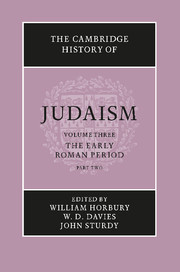Book contents
- Frontmatter
- 1 The archaeology of Palestine 63 bce–ce 70
- 2 The Herodian Temple
- 3 Recent archaeology in Palestine: achievements and future goals
- 4 The contribution of Jewish inscriptions to the study of Judaism
- 5 The social, economic and political history of Palestine 63 bce–ce 70
- 6 The Diaspora in the Roman period before ce 70
- 7 The Gentiles in Judaism 125 bce–ce 66
- 8 Gentiles as seen by Jews after ce 70
- 9 The synagogue
- 10 The Temple and the synagogue
- 11 The early liturgy of the synagogue
- 12 Women in the synagogue
- 13 The Pharisees
- 14 The Sadducees – their history and doctrines
- 15 The Essenes
- 16 The baptist sects
- 17 The troublemakers
- 18 The Samaritans and their sects
- 19 Galilean Judaism and Judaean Judaism
- 20 Jesus: from the Jewish point of view
- 21 Paul: from the Jewish point of view
- 22 Jewish Christianity
- 23 Apocalyptic: the disclosure of heavenly knowledge
- 24 The Qumran sectarian writings
- 25 The Dead Sea Scrolls and pre-Tannaitic Judaism
- 26 Prayer in the Qumran Texts
- 27 Philo of Alexandria
- 28 Josephus (ce 37–c. 100)
- 29 The rabbi in second-century Jewish society
- 30 The Hellenistic–Roman Diaspora ce 70–ce 235: the archaeological evidence
- 31 The legacy of Egypt in Judaism
- 32 Jewish elements in gnosticism and magic c.ce 70–c.ce 270
- Bibliographies
- Index
- References
18 - The Samaritans and their sects
Published online by Cambridge University Press: 28 March 2008
- Frontmatter
- 1 The archaeology of Palestine 63 bce–ce 70
- 2 The Herodian Temple
- 3 Recent archaeology in Palestine: achievements and future goals
- 4 The contribution of Jewish inscriptions to the study of Judaism
- 5 The social, economic and political history of Palestine 63 bce–ce 70
- 6 The Diaspora in the Roman period before ce 70
- 7 The Gentiles in Judaism 125 bce–ce 66
- 8 Gentiles as seen by Jews after ce 70
- 9 The synagogue
- 10 The Temple and the synagogue
- 11 The early liturgy of the synagogue
- 12 Women in the synagogue
- 13 The Pharisees
- 14 The Sadducees – their history and doctrines
- 15 The Essenes
- 16 The baptist sects
- 17 The troublemakers
- 18 The Samaritans and their sects
- 19 Galilean Judaism and Judaean Judaism
- 20 Jesus: from the Jewish point of view
- 21 Paul: from the Jewish point of view
- 22 Jewish Christianity
- 23 Apocalyptic: the disclosure of heavenly knowledge
- 24 The Qumran sectarian writings
- 25 The Dead Sea Scrolls and pre-Tannaitic Judaism
- 26 Prayer in the Qumran Texts
- 27 Philo of Alexandria
- 28 Josephus (ce 37–c. 100)
- 29 The rabbi in second-century Jewish society
- 30 The Hellenistic–Roman Diaspora ce 70–ce 235: the archaeological evidence
- 31 The legacy of Egypt in Judaism
- 32 Jewish elements in gnosticism and magic c.ce 70–c.ce 270
- Bibliographies
- Index
- References
Summary
The greatest problem in reconstructing the history of the Samaritans during the first centuries of Roman rule is the dearth of literary sources and the overtly hostile nature of those sources, both Jewish and Christian, which have survived.
Josephus was unwilling even to consider the Samaritans Jews: ‘When the Jews are in difficulties, they deny that they have any kinship with them, thereby indeed admitting the truth, but whenever they see some splendid bit of good fortune come to them, they suddenly grasp at the connection with them, saying that they are related to them and tracing their line back to Ephraim and Manasseh, the descendants of Joseph’ (Ant. xi.341). The polemical tone of this passage is obvious. But even in Josephus' famous description of the Jewish sects (Bell. ii.119–66), where the Samaritans do not appear at all, modern scholarship has detected anti-Samaritan motivation in his handling of his sources. It has been argued that underlying both Bell. ii.119ff and a similar description of the Jewish sects by the Patristic author Hippolytus (Philosophumena, Bk. 9, end) was a common literary source on the sects, which each writer abbreviated and expanded in a way independent of the other. The common source was an account of ‘the three’ Jewish sects, Pharisees, Sadducees and Samaritans. To this, before it came into the hands of Josephus and Hippolytus, an account of the Essenes had been added, and the passages on the Sadducees and the Samaritans had been condensed into one to keep the number of the sects at three.
- Type
- Chapter
- Information
- The Cambridge History of Judaism , pp. 569 - 595Publisher: Cambridge University PressPrint publication year: 1999
References
- 1
- Cited by

